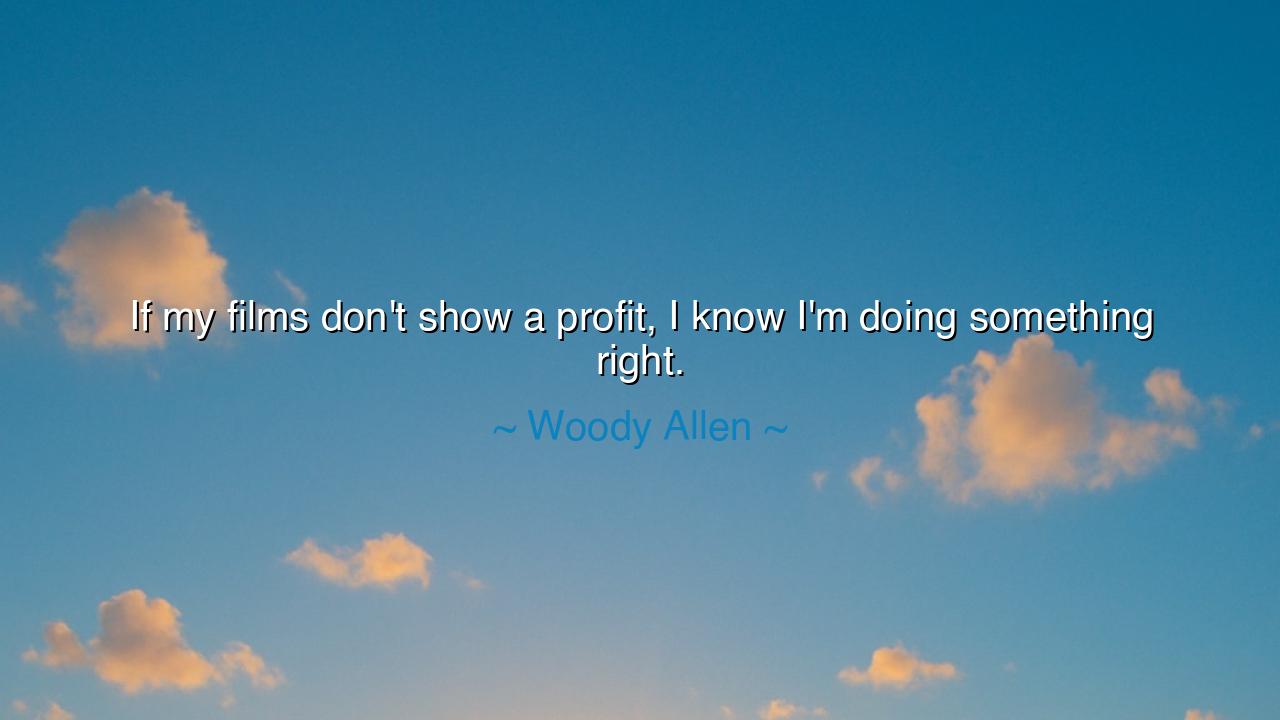
If my films don't show a profit, I know I'm doing something






Hear the paradoxical yet piercing words of Woody Allen, who declared: “If my films don’t show a profit, I know I’m doing something right.” At first, this saying seems to mock the logic of the world, for are not works of art judged by their gold, and artists by their success at the market? Yet here the wisdom lies inverted: to chase only profit is to serve the crowd’s hunger, but to pursue what is right is to serve the soul. Allen, with a voice both rebellious and ironic, reminds us that true creation is not the slave of commerce, but the servant of vision.
The origin of this thought springs from the eternal conflict between art and profit. The marketplace demands what pleases the many: spectacle, comfort, familiarity. But the artist is often drawn to the unsettling, the strange, the deeply human truth that does not flatter but reveals. When such works appear, they may fail at the box office, for truth rarely sells as well as fantasy. Yet, in the eyes of the artist, this failure is a sign of integrity—proof that they have not betrayed their craft to appease the masses. To “not show a profit” may mean that the work dared to speak what others did not wish to hear.
History itself confirms this teaching. Think of Vincent van Gogh, who in his lifetime sold almost none of his paintings. To the merchants of his day, he was a failure. Yet his works—vivid, unprofitable, misunderstood—became treasures of eternity, transforming art forever. His lack of profit was the mark that he was doing something right, for he pursued vision, not currency. Only later did the world awaken to his genius. Allen’s words echo this lesson: that the true value of art is not in coins, but in courage.
The same may be said of Galileo, who, in defiance of the profit of favor and position, declared that the earth moved around the sun. He gained no worldly success from this claim—indeed, he faced condemnation and peril. Yet history crowns him victor, for he chose what was right over what was comfortable. His “profit” was not in silver, but in truth that endured beyond his age.
What Allen dares us to see is that success can be a snare. When the artist grows too eager for applause, too mindful of revenue, they risk softening their vision, smoothing their edges, and feeding the crowd sugar instead of bread. But when an artist creates without fear of failure, without bowing to the golden idol of commerce, then their work is free. Such art may stumble in the market, but it will stand in the heart of time.
The lesson is this: do not measure your worth by profit alone. If your work, your choices, your creations do not always win applause or coin, take heart. Ask instead: did they hold truth? Did they bear integrity? Did they carry the fire of what you knew in your soul to be right? If so, then let the absence of profit be your crown, not your shame. For it is better to fail with honesty than to prosper with deceit.
So, children of tomorrow, take these words as your shield: do not let the glitter of profit blind you to the radiance of truth. Walk the path of the right, even if it is lonelier, even if it is unprofitable, even if it brings you mockery. For in the long reckoning of time, silver tarnishes and applause fades, but truth endures like flame upon the mountain. And when you look back upon your life, you will know that in losing the world’s profit, you gained the soul’s reward.






AAdministratorAdministrator
Welcome, honored guests. Please leave a comment, we will respond soon